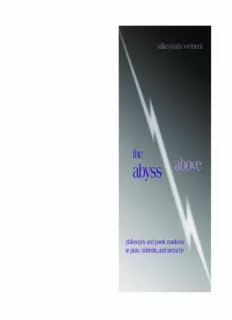
The abyss above : philosophy and poetic madness in Plato, Hölderlin, and Nietzsche PDF
Preview The abyss above : philosophy and poetic madness in Plato, Hölderlin, and Nietzsche
77420 cover 6/28/02 2:00 PM Page 1 LITERATURE / PHILOSOPHY w silke-maria weineck e i the abyss above n e c k philosophy and poetic madness in plato, hölderlin, and nietzsche silke-maria weineck In The Abyss Above, Silke-Maria Weineck offers the first sustained discus- sion of the relationship between poetic madness and philosophy. Focusing on the mad poet as a key figure in what Plato called “the ancient quarrel between philosophy and poetry,” Weineck explores key texts from antiquity to modernity in order to understand why we have come to associate art with irrationality. She t h shows that the philosophy of madness concedes to the mad a privilege that e continues to haunt the Western dream of reason, and that the theory of creative madness always strains the discourse on authenticity, pitching the controlled, a repeatable, but restrained labor of philosophy against the spontaneous produc- the b tion of poetic texts said to be, by definition, unique. y above s abyss “This book is a major contribution “Absolutely fascinating on every s to the exploration of madness. page. One learns from Weineck’s way Weineck’s original readings demon- of putting things as well as from the a strate her admirable grasp of German points themselves. “ b intellectual history and literature. Her — John McCumber, author of o argumentation is sophisticated.” Poetic Interaction:Language, v — Karin Bauer, author of Freedom, Reason e Adorno’s Nietzschean Narratives:Critiques of Ideology, Silke-Maria Weineck is Assistant Readings of Wagner Professor of German Studies at the University of Michigan. “No one intending to think or write on Plato, Hölderlin, or Nietzsche can State University of New York Press afford to do so without a knowledge of www.sunypress.edu Weineck’s chapters.” — Stanley Corngold, author of philosophy and poetic madness Complex Pleasure:Forms of Feeling in German Literature in plato, hölderlin,and nietzsche s u n y THE ABYSS ABOVE Silke-Maria Weineck A A BYSS BOVE THE Philosophy and Poetic Madness in Plato, Hölderlin and Nietzsche State University of New York Press Published by State University of New York Press Albany © 2002 State University of New York All rights reserved Printed in the United States of America No part of this book may be used or reproduced in any manner whatsoever without written permission. No part of this book may be stored in a retrieval system or transmitted in any form or by any means including electronic, electrostatic, magnetic tape, mechanical, photocopying, recording, or otherwise without the prior permission in writing of the publisher. For information, address State University of New York Press 90 State Street, Suite 700, Albany, NY 12207 Production and Book Design, Laurie Searl Marketing, Patrick Durocher Library of Congress Cataloging-in-Publication Data Weineck, Silke-Maria, 1963– The abyss above: philosophy and poetic madness in Plato, Hölderlin, and Nietzsche/ Silke-Maria Weineck. p. cm. Includes bibliographical references and index. ISBN 0-7914-5427-4 (hc : alk. paper) – ISBN 0-7914-5428-2 (pbk. : alk. paper) 1. Philosophy–History. 2. Poetry–History and criticism. 3. Literature and mental illness–History. 4. Plato. 5. Hèlderlin, Friedrich, 1770–1843. 6. Nietzsche, Friedrich Wilhelm, 1844–1900. I. Title. B66 .W45 2002 190–dc21 2002017726 10 9 8 7 6 5 4 3 2 1 for my families CONTENTS Acknowledgments ix Abbreviations xi Introduction: Future Perfect 1 Cassandra, or the Belated Truth of Madness 1 Total and Restricted Madness 4 The Limits of Madness and the Limits of Philosophy 9 From Divine Reason to Madness under the Death of God 11 Epilogue 17 Chapter One: Talking About Homer: Poetic Madness, Philosophy, and the Birth of Criticism 19 Talking about Homer 19 Phaedrus: Madly Made Meaning 32 Philosophy’s Mad Demon 45 Chapter Two: The Abyss Above: Hölderlin: Madness, Philosophy, and Tragedy in the Absence of the Gods 49 Introduction: Madness and the Labor of Poetry 49 Translating Greece 58 Antigone and Oedipus: Madness and Sign 64 viii Contents Chapter Three: Nietzsche: The Marketplaces of Madness 79 Introduction: Nietzsche’s Madness and the Fear of Contamination 79 Nietzsche’s Madmen (1): The Artist in the Ditch, or from Metaphysics to Metaphysiology 87 Nietzsche’s Madmen (2): Meta-Morality, or the Madness of New Thought 100 Nietzsche’s Madmen (3): The Last Madman on the Marketplace 108 The Hyperborean: La Vache Qui Danse 117 Conclusion: Logos and Pallaksch: Paul Celan’s “Tübingen, Jänner” 121 Anachrony 121 Appropriation 125 Anamnesis 127 Notes 137 Bibliography 167 Index 175
Description: